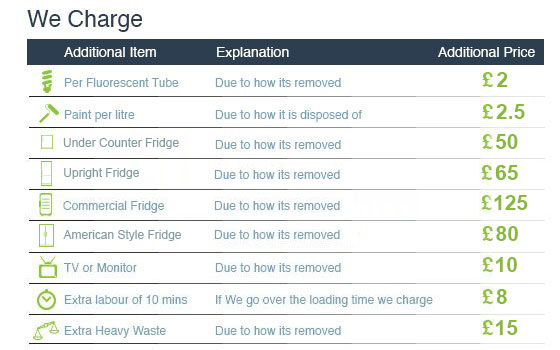Spring Cleaning Tips: Maximising Rubbish Clearance Efficiency
Posted on 14/11/2025

Sunlight creeps through the curtains. You spot dust on the skirting boards and the overflowing cupboard that keeps catching your eye. It's spring-cleaning season again, and truth be told, you can almost smell the cardboard dust in the air. If you've ever stood in a cluttered hallway wondering where to start, you're not alone. This guide brings together hard-won experience, sensible systems, and a bit of friendly encouragement to help you clear rubbish fast, safely, and legally--without losing your weekend (or your sanity).
What follows is a practical, UK-focused deep-dive into Spring Cleaning Tips: Maximising Rubbish Clearance Efficiency. Whether you're clearing a one-bed flat in Brighton, a Victorian terrace in London, or a family home in Manchester, you'll get a clear plan, smart tools, and realistic tactics that actually work. Clean, clear, calm. That's the goal.
Why This Topic Matters
Clutter isn't just visual noise. It costs time, energy, and sometimes real money. In the UK, households generate millions of tonnes of waste each year (DEFRA data points to roughly 26 million tonnes annually), and a good chunk of that passes through our homes during seasonal clean-ups. When those clear-outs are unplanned, waste can pile up, recyclable materials get mixed, and costs surge--both for your wallet and the environment.
Spring is a natural reset button: better light, milder weather, and that itch to open windows and refresh every room. But let's face it--without a method, spring-cleaning can become a half-finished project you dodge for weeks. With the right approach, you can turn a stressful chore into a purposeful process: less lifting, fewer trips, lower costs, more reuse, and a space that feels lighter. And, importantly, you can keep it fully compliant with UK regulations--because fly-tipping is never worth the risk.
Micro moment: A client once told us, "I just want to walk from the front door to the kitchen without shifting boxes." We cleared the hallway first. Ten minutes later, the house already felt bigger. You could hear it in the quiet.
Key Benefits
- Time savings: Structured sorting and batching cuts your effort in half. No backtracking, fewer decisions, less brain fog.
- Lower costs: Separating recyclables, donations, and resale items reduces paid waste volume. Efficient booking gets better service rates.
- Legal peace of mind: Choosing licensed carriers and keeping simple paperwork avoids fines and protects you.
- Environmental gains: Reuse and responsible recycling means less landfill and more materials re-entering the supply chain.
- Safer homes: Removing hazards (like old paint, frayed cables, and blocked exits) improves fire safety and wellbeing.
- Clarity and calm: A clear space helps you think better. It's not just tidier; it's lighter--physically and emotionally.
In our experience, you'll also sleep better knowing what's gone, what's kept, and where everything lives now. Small thing. Big difference.
Step-by-Step Guidance
Here is the practical, proven sequence we use on real jobs across the UK for Spring Cleaning Tips: Maximising Rubbish Clearance Efficiency. Follow it loosely or to the letter--either way, you'll move faster with less stress.
1) Decide your scope and deadline
- Define the win: "Clear the loft and spare room today," is better than "clean house." Be specific.
- Set time blocks: Two or three 60-90 minute sessions. Breaks included. You're human, not a robot.
- Book the service window early: If you'll need a rubbish clearance team or skip, schedule now and work towards that date.
Micro moment: It was raining hard outside that day, but the client lit a candle in the hallway. Calm background, simple target. We finished early.
2) Create three core zones (Keep / Donate-Resell / Dispose)
- Keep: Items you actively use in the last year, or truly value.
- Donate-Resell: Good condition items for charity or resale.
- Dispose: Broken, expired, or genuinely redundant items.
Lay out three tarps or use labelled boxes. Keep these zones visible at all times. It's a silly little trick but it speeds decisions massively.
3) Triage room by room, front to back
- Start at the entrance: Clear the hallway first. Quick win, instant relief. You'll feel momentum.
- Then high-traffic areas: Kitchen counters, living room surfaces, bathroom basket.
- Finally storage spaces: Lofts, sheds, under-stairs, and that drawer of cables (we know).
Tip: Keep a small "Maybe" box but cap it at 10 items. Review at the end. Decisions get easier once the bulk is sorted.
4) Batch items for efficiency
- Electronics together: Laptops, phones, keyboards, cables for WEEE recycling.
- Textiles together: Clothes, bedding, towels for donation or textile recycling.
- Paper and data: Separate personal paperwork for shredding or secure disposal.
- Bulky furniture: Disassemble where possible to reduce volume and cost.
Batching reduces lift-load cycles and helps carriers quote more accurately. You'll see your volume clearly, which means fewer surprises.
5) Pre-sort for resale and donation
- Resale: Photograph higher-value items (good lighting, neutral background). Check completed listings on marketplaces to gauge price, not just asking prices. To be fair, some things aren't worth the faff--donate instead.
- Donation: Bag clothes and label sizes (M/L, kids 5-6). Keep charity shop guidelines in mind: clean, undamaged, complete sets if possible.
6) Plan disposal routes
- Man-and-van clearance: Fast, flexible, often cheaper than a skip for mixed waste. Check for Environment Agency waste carrier licence.
- Skip hire: Good for heavy construction waste. Requires a council permit if on the road. Don't mix prohibited items (mattresses, fridges, paints) without checking first.
- HWRC (tip): Free or low-cost, but may require ID, proof of address, and pre-booked slots. Perfect for small batches if you've got a car.
7) Schedule the pick-up smartly
- Off-peak slots: Weekday mornings can be cheaper and quicker.
- Loading access: Reserve parking, measure doorways, protect floors. If you're in London, consider ULEZ and Congestion Charge zones for vehicle access.
- Safety: Heavy items first, fragile last, pathways clear. Gloves on. Keep kids and pets away from the work zone.
8) Keep minimal records
- Waste transfer note: Ask your carrier for it (they should provide). Keep for two years.
- Photos: Before-and-after shots help for landlord checks or just to feel proud later. You'll want them, oddly.
9) Reset and maintain
- Storage: Clear, labelled boxes. Heavier items low, lighter items high.
- Daily micro-tidy: Two minutes per room. Sounds small; works big.
- Quarterly review: A quick refresh stops clutter creeping back.
Ever tried clearing a room and found yourself keeping everything? It's fine. Walk away for five minutes, make tea, come back and decide again. The pause helps.
Expert Tips
These are the little moves that separate an average clear-out from a smooth, fast, budget-friendly one. Our Spring Cleaning Tips: Maximising Rubbish Clearance Efficiency list wouldn't be complete without them.
Use the 20:20 rule for "maybe" items
If it's under ?20 to replace and you haven't used it in 20 months, let it go. Exceptions exist, but the rule is surprisingly effective. Yeah, we've all been there.
Weight before volume
Move heavy and bulky items first. Not only is it safer, it frees space fast so you can position boxes, trolleys, and bags sensibly. Your back will thank you.
Label on two sides
Write the label on the top and one side of each box. When they stack, you'll still know what's inside. Obvious, but gold.
Colour-code for speed
- Green: Keep
- Blue: Donate/Resell
- Red: Dispose
Coloured tape or sticky notes help your brain at a glance. Less thinking, more doing.
Pre-disassemble flat packs
Use zip bags for screws and tape them to the main panel. Reduces volume, avoids lost fixings, and makes the carrier's job quicker.
Photograph cables before unplugging
Snap a quick picture of the TV or router setup. Reassembly later is painless, and you won't end up with a mystery HDMI in your pocket.
Stack by destination
Place clearance items near the exit (but not blocking it). Donations by the door. Recyclables near the car. Clear paths mean faster, safer work.
Secure data shredding
For sensitive paperwork, use a cross-cut shredder or a secure shredding service. If you handle customer data at home, you have obligations under GDPR--don't wing it.
Hydration and air
Windows open, dust mask on if needed, water bottle nearby. It's not a marathon, but it can feel like one. Pace yourself.
Common Mistakes to Avoid
- Over-sorting upfront: Spending 10 minutes deciding the fate of an old charger is a trap. Bag "cables" now, decide later as a group.
- Mixing waste streams: Throwing batteries, paint, or electronics into general rubbish can lead to penalties and environmental harm. Keep hazardous items separate.
- Not checking licences: If your waste is fly-tipped by a rogue carrier, you can still be fined. Always verify the waste carrier licence.
- Underestimating volume: A "few bags" often becomes "a small mountain." Measure rough cubic yards or take a photo for quotes.
- Skip overuse: Hiring a skip for mixed household clutter can cost more than a man-and-van clearance. Choose the right tool.
- Forgetting access: No parking or narrow stairs can stall the job. Plan routes and get permits if needed.
- Last-minute donation drop: Charities have limits; check opening hours and what they accept.
Micro moment: We once arrived to a fourth-floor flat with no lift and a sofa that didn't fit the stair turn. We trimmed the feet, wrapped the corners, and eased it out sideways. Awkward? Yes. But it worked.
Case Study or Real-World Example
Scenario: Two-bed London flat, young family, hallway blocked, loft overflowing, buggy and bikes tangled by the door. Goal: a safe, clear home before baby number two arrives in six weeks.
- Scope: Hallway, living room, loft, and bedroom wardrobes.
- Plan: One Saturday pre-sort (3 hours), one weekday morning clearance (2 hours).
- Method: Three-zone system, bulky items first, man-and-van with licensed carrier.
Execution: We started at the entrance. Shoes into a slim rack, coats pared back to essentials, buggy folded and hung. Then loft: we batched baby clothes, books, and electronics. TVs and laptops moved to WEEE. A quick check on charities accepting baby gear saved time. The carrier arrived Tuesday morning, and we had reserved a parking bay with a visitor permit.
Results: 14 bags donated, 8 boxes recycled, 3 cubic yards of mixed waste removed, 1 fridge collected separately, and 2 hours saved compared to a skip solution due to faster loading and no permit. The hallway echoed slightly when we walked through--always a good sign. Cost came in about 20% less than their initial skip idea, and zero compliance worries.
It wasn't glamorous, but the parents said the home felt "peaceful" for the first time in months. That's the word we aim for.
Tools, Resources & Recommendations
To turbocharge Spring Cleaning Tips: Maximising Rubbish Clearance Efficiency, have the right kit and resources ready. You don't need everything--but you do need enough.
Essential gear
- Work gloves: Protect hands and grip better.
- Dust masks: For lofts and old boxes, they're a blessing.
- Heavy-duty sacks: Double-bag sharp or heavy items.
- Tape, marker, labels: Write big, label twice.
- Zip bags for screws: Tape to furniture panels.
- Furniture sliders or dolly: Reduce lifting strain.
- Basic toolkit: Screwdriver set, Allen keys, utility knife, measuring tape.
Digital helpers
- Note apps: Keep a running list of rooms and tasks. Tick-tick, Notion, or even your phone's default notes app works.
- Photo album: Create a "donate/resell" album for quick sharing or valuation.
- Calendar reminders: Queue a quarterly tidy prompt. Future-you will be chuffed.
Donation and reuse options in the UK
- Charity shops: British Heart Foundation, Cancer Research UK, local hospice shops. Many collect furniture.
- Community networks: Freecycle, Olio, local Facebook groups. Fast and friendly.
- Textile banks: For worn-out clothing. Check council sites for locations.

Rubbish clearance vs skip hire
- Rubbish clearance (man-and-van): Best for mixed household waste and when you want loading included. Often same-day. You pay by volume or weight.
- Skip hire: Great for heavy rubble or renovation debris. Needs space, possibly a permit, and you do the loading.
Cost ranges: Prices vary by region and access, but a small man-and-van load might be in the low hundreds, while an 8-yard builder's skip often runs higher once permits and parking are factored in. Always compare with your actual waste mix and volume.
Law, Compliance or Industry Standards (UK-focused)
Keeping your spring clearance lawful is simpler than it sounds. Follow these basics and you'll be solid.
Environmental Protection Act 1990 & Duty of Care
- Check waste carrier licence: Verify your carrier with the Environment Agency. If your waste is fly-tipped, you could still be liable.
- Waste Transfer Notes: Keep them for two years. The carrier should provide these.
WEEE Regulations (Waste Electrical and Electronic Equipment)
- Electronics (TVs, laptops, fridges) must be handled properly and not landfilled with general waste.
- Retailers sometimes offer take-back. Otherwise, use a licensed carrier or HWRC.
Hazardous Waste considerations
- Paint, chemicals, solvents, batteries, fluorescent tubes, and some garden treatments count as hazardous.
- Never mix hazardous waste with general rubbish. Use council collection points or specialist disposal.
Skip permits and placement
- If placing a skip on a public highway, you'll likely need a council permit and safety measures (lights, cones). Lead times vary.
- Private drive? Usually fine without a permit, but protect surfaces.
Data protection (GDPR)
- Shred or securely dispose of documents containing personal data. If you run a business from home, your obligations are higher.
- Wipe electronics or use certified data destruction services--don't rely on a casual delete.
Health & Safety (HSE guidance)
- Manual handling: Keep loads close, bend knees, don't twist while lifting. Share heavy loads. There's no fixed "legal limit," but 25 kg is a common upper guide for a single-person lift depending on the situation--err on the safe side.
- Protective gear: Gloves, closed footwear, eye protection for dusty lofts.
One last UK-specific point: fly-tipping penalties are steep, and rightly so. Choose responsible routes. The environment--and your wallet--will thank you.
Checklist
Print or screenshot this Spring Cleaning Tips: Maximising Rubbish Clearance Efficiency checklist and tick as you go.
- Define scope and time blocks.
- Set up Keep / Donate-Resell / Dispose zones.
- Clear entrance first for quick morale boost.
- Batch items: electronics, textiles, paper, bulky furniture.
- Photograph higher-value items for potential resale.
- Book rubbish clearance or skip as needed; verify licence and permits.
- Prepare access: parking, lifts, stairs, protect floors.
- Gather gear: gloves, sacks, labels, tools, dolly.
- Segregate hazardous waste and WEEE.
- Keep Waste Transfer Notes and photos.
- Reset storage and schedule a quarterly tidy reminder.
Short, simple, strong. You'll move fast with this.
Conclusion with CTA
Spring cleaning doesn't have to mean three weeks of mess and a car boot full of mystery bags. With a little structure--and a few insider tricks--you can make space, save money, and protect the planet, all while staying firmly on the right side of UK rules. To be fair, the hardest part is just starting. Once you see that first clear corner, you'll be flying.
Ready to move from plan to action? Whether you need quick man-and-van rubbish clearance, advice on permits, or help sorting WEEE and donations, we're here to make it easy, fast, and compliant.
Get a free quote today and see how much you can save.
Clean home. Clear mind. New season--new energy. You've got this.


















